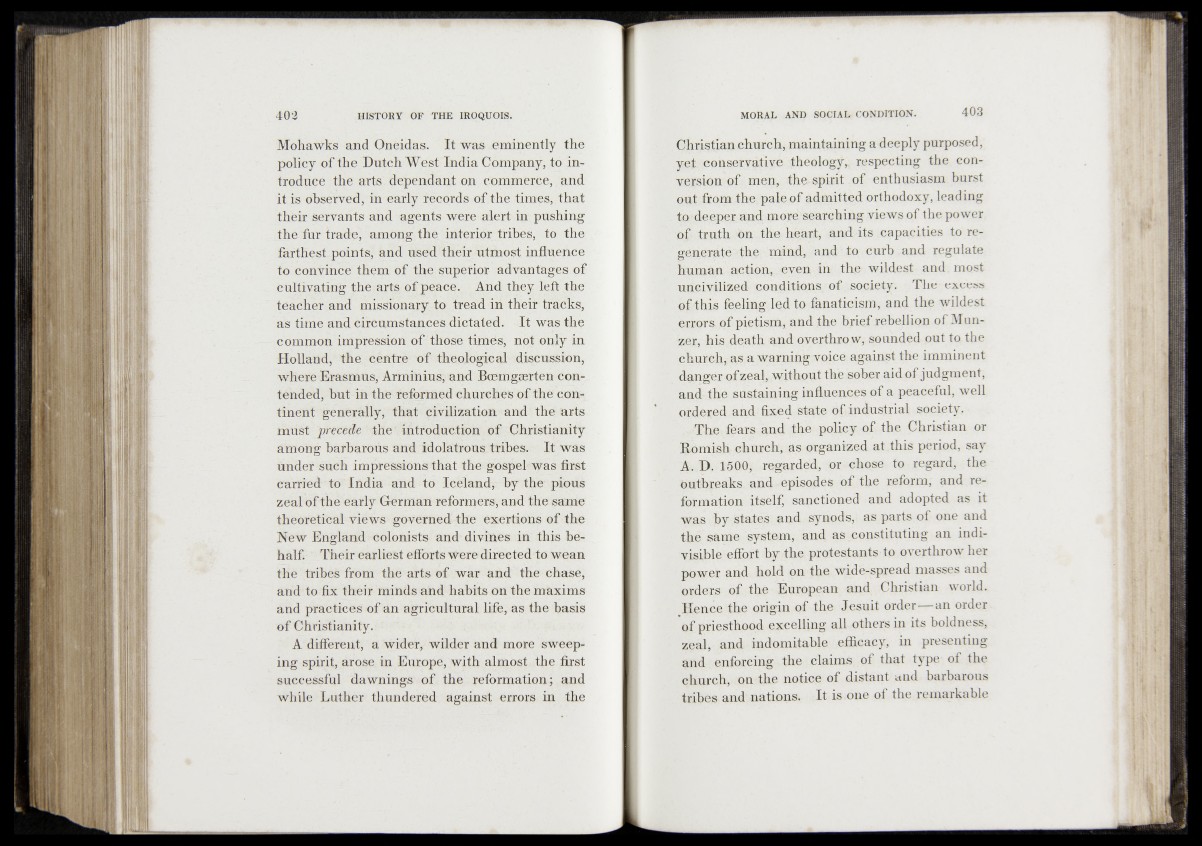
Mohawks and Oneidas. It was eminently the
policy of the Dutch West India Company, to introduce
the arts , dependant on commerce, and
it is observed, in early records of the times, that
their servants and agents were alert in pushing
the fur trade, among the interior tribes, to the
farthest points, and used their utmost influence
to convince them of the superior advantages of
cultivating the arts of peace. And they left the
teacher and missionary to tread in their tfa'cks,
as time and circumstances dictated. It was the
common impression of those times;, not only in
Holland, the centré of theological discussion,
where Erasmus, Arminius, and Bcemgærten contended,
but in the teformed churches of thé' continent
generally, that ffviliiatipn* and the arts
must precede the introduction of Christianity
among barbarous and idolatrous, tribes.. It wâs
under such impressions that the gbspebwas first
carried to India and to Iceland, by the pious
zeal of the early German reformers-, and the same
theoretical views governed the exertions of the
New England colonists and divines in this behalf.
Their earliest efforts were directed to wean
the tribes from thé arts of war and the chase,
and to fix their minds and habits on the maxims
and practices of an agricultural life, as the basis
of Christianity.
A different, a wider, wilder and more sweeping
spirit, arose in Europe, with almost, the first
successful dawnings of the reformation ; and
while Luther thundered against errors in the
Christian church, maintaining a deeply purposed,
yet conservative theology* respecting the conversion
of men, the, spirit of enthusiasm burst
out from the. pale of admitted orthodoxy, leading
to. deeper and more searching views of the power
O^ truth bn the heart, and its capacities to regenerate
The mind, and to curb and regulate
human action* even in thje wildest and. most
unclyilized conditions, of society. The excess
of this feeling Jed-to fanaticism, and the wildest
errors of pietism, and the brief rebellion of Mun-
-zer, his death and overthrow, sounded out to the
church, as a warning voice against the imminent
danger of zeal, without the sober aid of judgment,
and the sustaining influences of a peaceful, well
ordered and fixed state of industrial society.
The. fears pnd the policy of the Christian or
Bomish; church, gs organized at,this period, say
A. D. 1500, regarded, or chose to regard, the
outbreaks and épisodes of the reform, and reformation
itself, sanctioned and adopted as it
was by states and synods, as parts of one and
the same system, and as constituting an indivisible
effort by the pro overthrow her
power and hold on the wide-spread masses and
orders- Of the European and Christian world.
Hence the origin of the Jesuit order—an order
of priesthood excelling all others in its boldness,
zeal, and indomitable eflicacy, in presenting
and. enforcing the claims of that type of the
church, on the notice of distant and barbarous
tribes and nations. It is.one of the remarkable